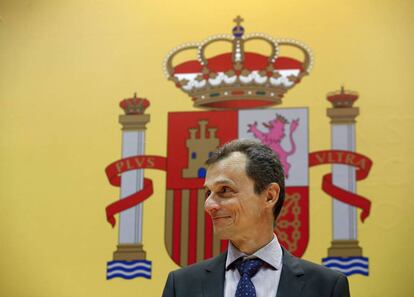Astronaut minister: “We still have time to put Spain at the forefront of science”
Pedro Duque, at the helm of science, innovation and universities in the new Socialist government, has promised to get rid of the bureaucratic barriers to scientific research

Spain’s first astronaut government minister, Pedro Duque, has officially assumed his role as the head of science, innovation and universities. He received the post with a touch of humor, telling the audience at the handover ceremony: “You all know my professional and orbital career.”
As minister of science – a portfolio that did not exist under the former government of Popular Party Prime Minister Mariano Rajoy – Duque promised to focus on “future development, in science, technology, higher education” to “ensure the wealth and well-being of future generations.”
What’s important is to create spaces in which scientists feel comfortable Science minister Pedro Duque
His promise comes at a difficult moment for science in Spain. Funding for development and innovation research was cut by 9% between 2009 and 2016 just as the European Union was increasing spending by 27.4%. Making matters worse, the bureaucratic restrictions imposed under Rajoy have brought activity in public research organizations and strategic centers to a standstill.
With elections looming, Duque has little time to implement his plans. He is also tied to the 2018 budget approved under the former government, which will make it difficult to increase funding to science. “We will do everything possible,” said Duque. “We still have time, we need to push to position ourselves at the forefront of science and innovation… We have to try for our young people.”
Young researchers and engineers have been the hardest hit by the cutbacks to science
Young researchers and engineers have been the hardest hit by the financial crisis and cutbacks to science. Thousands left the country, while others were left without work as they waited for research centers to complete the long administrative process to formalize their contracts.
Duque says his main objective is to eliminate the bureaucracy that makes it difficult for scientists to be contracted, impedes the spending of European funds for projects, and delays material purchases – issues that hurt Spain’s competitiveness in the field. To achieve this, the astronaut will need to negotiate with new Treasury Minister María Jesús Montero. On the top of the agenda is the State Research Agency (AEI), which is months behind on its grants to Spain’s most important research programs.
In 2019, new statutes will be created for the AEI, Spanish National Research Council (CSIC) and Center for the Development of Industrial Technology (CDTI), providing an opportunity to modernize the institutions and give them greater independence.
“I am aware of the problems,” said Duque at the ceremony. “I have received thousands of indicators and now we have to address what is most urgent.”
“We have problems with the agility with which budgets are distributed, and we are going to see if we can do something about that,” he explained. “What’s important is to create spaces in which scientists feel sufficiently comfortable and for the administration to support them.”
Duque says he aims to accomplish this by “speaking with everyone and reaching a consensus … What’s most important is to do a job that lasts,” and to think about “what we want the future to be like in 20 years,” he added.
English version by Melissa Kitson.
Tu suscripción se está usando en otro dispositivo
¿Quieres añadir otro usuario a tu suscripción?
Si continúas leyendo en este dispositivo, no se podrá leer en el otro.
FlechaTu suscripción se está usando en otro dispositivo y solo puedes acceder a EL PAÍS desde un dispositivo a la vez.
Si quieres compartir tu cuenta, cambia tu suscripción a la modalidad Premium, así podrás añadir otro usuario. Cada uno accederá con su propia cuenta de email, lo que os permitirá personalizar vuestra experiencia en EL PAÍS.
¿Tienes una suscripción de empresa? Accede aquí para contratar más cuentas.
En el caso de no saber quién está usando tu cuenta, te recomendamos cambiar tu contraseña aquí.
Si decides continuar compartiendo tu cuenta, este mensaje se mostrará en tu dispositivo y en el de la otra persona que está usando tu cuenta de forma indefinida, afectando a tu experiencia de lectura. Puedes consultar aquí los términos y condiciones de la suscripción digital.









































